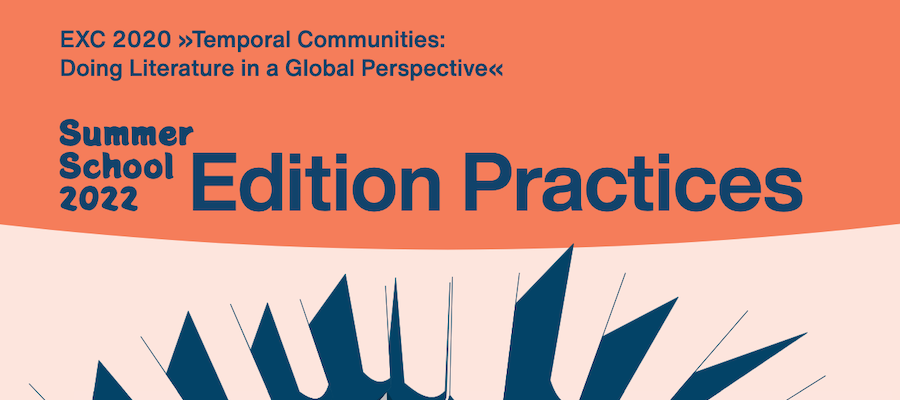Edition Practices, EXC 2020 »Temporal Communities: Doing Literature in a Global Perspective« 2022 Summer School, Berlin, September 26–30 and October 4–7, 2022
The focus of this year's Summer School “Edition Practices” is the examination of editorial practices, i.e. procedures of analogue and digital text edition, in relation to text and manuscript corpora from different epochs and manuscript cultures. On the mornings of the first week, the programme includes expert lectures and workshops with renowned editors and scholars of the theory and practice of editing. On the basis of selected editions, they will provide insights into the handling of original texts, text versions and variants, the conception of apparatuses, commentaries and indices, and will use concrete, implementation-oriented examples to introduce the procedures of edition practice in relation to different subject areas. In addition, specialist contributions are planned which will be devoted to the history of edition philology and the principles of its respective practical implementation, introduce current debates on edition procedures and, above all, discuss different edition methods (print, digital, hybrid) and their respective material-aesthetic, philological and technical prerequisites. The expert lectures will always focus on very concrete objects, problems and solutions and will deal with material-related issues such as text selection and constitution, collation, material structuring, layout and typesetting, the internal organisation of editions as well as questions of user-friendliness, and will address both print and digital editions and put their methodological problems/solutions up for discussion. In addition to this series of expert contributions, two on-site visits to Berlin libraries and archives are planned in order to gain insight into material and manuscript collections and to deepen the discussion of different editing techniques using concrete documents and materials.
The afternoons of the first week of the Summer School and the entire second week will be reserved for exchanges about the participants' respective edition projects. They will offer the participants space to present their current editing work in a material-rich way, to demonstrate concrete problems and approaches to solutions, to discuss questions of detail and to enter into an interdisciplinary professional exchange on questions of editing practice using selected editing samples. These workshops will each be accompanied and moderated by the experts. In these panels we will allow plenty of time for project presentations and joint discussion. Precisely because editors are often focused on their own project or project team, the opportunity for editors and scholars of the theory and practice of editing working on text collections from different philologies, epochs and cultures to meet together will enable concentrated comparative and interdisciplinary cooperation, initiate longer-term networking and promote international exchange.
The Summer School is aimed at editors, philologists and scholars of the theory and practice of editing who are currently working on their own edition project or on methodological questions of text edition/edition philology within the framework of a doctoral or post-doctoral project. We are interested in editions (but also in the history and theory of editions) from German studies, philosophy, classical philology and all other philological and cultural studies disciplines. We welcome applications not only from Berlin and the Federal Republic of Germany, but also and especially from abroad.
There is no fee for participation in the Summer School. Catering during lunch and coffee breaks will be provided by the hosts.
Conceived and organised by Anne Eusterschulte (Freie Universität Berlin; Research Area 3: "Future Perfect"), Glenn W. Most (Max Planck Institute for the History of Science, Berlin; Committee on Social Thought, Univ. Chicago; Research Area 3: "Future Perfect") and Gerald Hartung (Univ. Wuppertal; AG Philosophical Editions)
